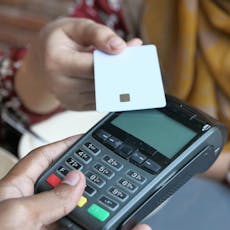A credit builder card is specifically designed to help you build your credit score if you have bad or no credit history.
See which credit cards you're eligible for
Comparing won’t affect your credit score



By Matt Fernell, Editor at Finance.co.uk.

Credit building cards are a unique type of credit card designed for those with poor or no credit history. Here’s how to find the right credit building credit card for you.
If you are looking for a credit card that can help you improve your credit record, it’s really important you only apply for cards you’re eligible for. Having an application rejected can hurt your credit score further.
That’s why we check your eligibility first so we can show you the cards you’ve got the best chance of getting.
Get a decision and compare deals in minutes
See credit building cards from a range of top providers
Only see the credit cards you’re eligible for
Check your eligibility with no impact on your credit score
Compare what each card offers to help you find the option that works best for you.
To help us find the cards you’re eligible for, we need to know about your:
Income: How much you earn a year, your employment status and your start date
Household: Your address, homeowner status and your mortgage contributions
Personal details: Your name, date of birth, contact details, and number of dependents
We need these details to perform a ‘soft check’ on your credit record. This helps us identify the credit building cards you’ll most likely get without impacting your credit score.
Here is what you need to think about when comparing credit builder credit cards:
Credit cards to build credit are designed to help you gradually improve your credit score, which means they’re best for occasional spending, which you can clear every month. Some cards also offer things like:
Earning rewards for everyday spending
However, it’s unlikely that a credit building card will offer the best deals. For example, you won’t be able to get a card with a long interest-free period, as this could encourage you to overspend and struggle to repay the balance.
The annual percentage rate (APR) is the interest rate you’ll be charged if you don’t clear your balance every month. The APR for credit building cards is often higher than average.
It’s worth trying to pay off your balance in full before interest is added to make the most of your card. Not only is this the best way to improve your credit score, but it will also save you from paying interest.
However, if you don’t think you’ll be able to clear the balance every month, look for a card with the lowest APR to keep the amount of interest you’ll be charged as low as possible.
Most credit builder cards have a much lower credit limit than other cards. This reduces the risk of overspending so you can repay the balance and gradually improve your credit score.
You usually won’t see the credit score each card offers until you apply, but it’s important to think about what limit you need. Make sure you choose a limit that allows you to spend what you need but that you can also afford to repay each month.
Spending above your credit limit will usually incur a fee and could further damage your credit score, making it harder to borrow in the future.
Credit cards designed to help you improve your credit score should be available, even if you have a poor rating. However, if you have very bad credit, for example, if you have been declared bankrupt or have CCJs, you might still find getting a credit building card challenging.
By using our eligibility checker, you’ll only see the cards you're more likely to qualify for before you apply. This can save you from having an application rejected, which can damage your credit score further.
To be eligible for any credit card in the UK, you will also need to:
Be over 18 or 21 with some providers
Have a permanent address in the UK
Have a steady income to show you can afford to repay what you borrow
They can help you to improve and build your credit rating
You’re likely to be accepted even if you have a poor credit score
Improves your chances of being accepted for cheaper financial products in the future
They can help you learn how to manage credit responsibly
Because your credit limit is likely to be low, you won’t be tempted to spend more than you can afford
They help to give you access to larger credit limits in the future
The interest rates on credit builder cards tend to be much higher than other credit cards
A low credit limit means you may not be able to use it for all of your spending
You can get into debt if you don’t repay your balance in full
It can further damage your credit rating if you don’t use your card responsibly
Your card could be used for credit card fraud
There may be other fees to pay, such as annual fees or fees for withdrawing cash
The information provided does not constitute financial advice, it’s always important to do your own research to ensure a financial product is right for your circumstances. If you’re unsure you should contact an independent financial advisor.
We're on a mission to improve the finances of the nation by helping you to spend wisely and save money



We're on a mission to improve the finances of the nation by helping you to spend wisely and save money



A credit builder card works in the same way as a regular credit card. You’ll be offered an amount you can borrow on the card to make purchases, and you’ll then be required to pay back at least a minimum amount each month.
The two main differences between a credit builder card and other credit cards are the amount you’ll be allowed to borrow and the interest rate you’ll be charged if you don’t pay back what you’ve borrowed in full each month.
Credit builder cards tend to have lower credit limits than other credit cards and charge higher interest rates.
Unlike regular credit cards, if you have a poor, little or no credit rating, you’re still likely to be accepted for a credit builder card.
It’s good to keep unused credit cards open for at least six months to benefit from the history it will leave on your credit report. Credit reference agencies reward you for having accounts open for a long time.
Closing your credit card accounts means you may lose out on building up your credit rating.
Closing a credit card can also impact your credit utilisation ratio. Credit utilisation measures how much of your total available credit is being used. The more credit you use, the worse the impact on your credit score.
An example of how closing a card with a zero balance could impact you:
Credit card one has a £1000 limit, and your balance is £1000
Credit card two has a £1000 limit and a £0 balance
Your credit utilisation on both cards combined is 50%. If you close credit card two, your utilisation jumps to 100%.
Providers like to see you using low percentages of your credit limits combined over different products. So, keeping an unused card open can help you in the long run.
Registering on the electoral roll at your current address will improve your credit score. Even if you have no intention to vote, putting yourself on the electoral roll will help, and you should get used to making it your priority every time you move. It’s important to do it even if you live with your parents or are in shared or student accommodation.
If you’ve never borrowed money, taken out a mobile phone contract, or paid household bills, you may have little or no credit history. You can take steps to build your credit history to access credit and good deals in the future.
Paying your bills on time and in full each month will help build your credit score.
It’s important to try and keep your credit usage low. If you’re given a credit limit on a credit card of £1,000, you want to try and borrow no more than £250. Keeping your credit utilisation low demonstrates you’re not desperate for money and can be disciplined enough not to spend the entire amount.
If you notice mistakes like an incorrect address or a credit account you don’t recognise, it’s crucial you contact the credit reference agency so they can investigate. A rogue account could hold you back, and mistakes regularly happen.
Lenders like to see stability, so if you move house a lot, some credit lenders might assume you’re having a problem paying rent. This one is more difficult to avoid in your early life when you’re moving around because of university and your early career choices, but indeed a point to bear in mind, especially before applying for a large credit product like a mortgage.
Lenders like to see that you can manage multiple credit accounts over a long period of time, so even if you no longer use a credit card, it might be a good idea to keep it open rather than close it. Credit reference agencies reward you for mature credit accounts where you only use a small percentage of your credit limit.
Getting a credit card when you have no credit history can be difficult because lenders need to know how reliable you are at managing credit. It is effectively the same as having bad credit; however, most credit building cards will accept applicants with little or no credit history.
Credit building cards are often considered ideal starter cards as they allow you to build up your score with a small credit limit, reducing the risk of overspending.